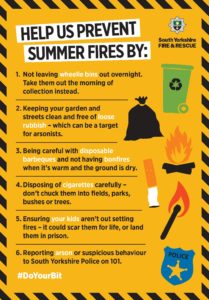There’s less than a week to go for people to have their say on fire service plans to meet a financial shortfall of up to £4 million.
Draft plans considered by South Yorkshire Fire & Rescue’s governing Fire Authority in May propose reducing the number of firefighters on a fire engine from five to four.
No firefighters would be made redundant under the proposals, with the reductions being achieved gradually as and when firefighters retire.
South Yorkshire Fire & Rescue says the only realistic alternative to making the change- which has already been adopted by many other services nationwide- is to reduce the speed of its 999 response during the night time period from up to half of its fire stations.
The organisation faces cost pressures of up to £4 million, due to no longer being able to use a way of staffing fire stations called Close Proximity Crewing and because it may have to meet a significant, national shortfall in pension contributions.
Deputy Chief Fire Officer Alex Johnson, said: “We’d rather not make any changes at all, but doing nothing is not an option. We think it’s better to reduce the number of firefighters on a fire engine, than it is to slow down response times to some of our communities by reducing the number of fire engines which are immediately available.
“We’re not making firefighters redundant and fire engines already ride with four people on them about a third of the time.”
“We’ve published our draft plans and invite the public to share their views on them before the consultation closes in a few days time.”
All fire and rescue authorities must provide a plan which sets out the steps they will take and resources they need to deliver public safety, reduce fires and save lives. This is known as an Integrated Risk Management Plan (IRMP). It must be publicly available, reflect consultation with stakeholders and demonstrate the most up-to-date analysis of local risk.
People can share their views via an online survey, at www.syfire.gov.uk/haveyoursay, or in writing to IRMP Consultation, South Yorkshire Fire & Rescue, 197 Eyre Street, Sheffield S1 3FG.
Once the consultation period has ended on 5 August and feedback has been considered, Fire Authority members will make the final decision on the proposals.
ENDS

